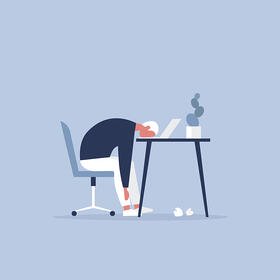Self Care for Optometrist Burnout
The term "self-care" has been floating around the internet more lately, but how does it apply to optometrists and their staff? Especially in healthcare, professionals have to make sure they're in good personal health and mentally prepared before they can help patients.
Self-care in optometry starts with limiting overtime work, taking frequent mental breaks, prioritizing lunch, and using annual paid time-off. There are a few other compelling reasons to prioritize your health and avoid burnout. Keep reading to see why your processes should trust in your staff, leave room for relaxation, and prioritize mental health in order to enjoy your work and your practice.
How to Avoid Burnout in Optometry
 Mental Health
Mental Health
We've mentioned that self-care starts with a foundation of solid mental and physical health. This could involve different things for different people. We find that regular exercise, meditation, support groups like ODs on Facebook, or therapy can be the answer for most people. Getting out of your routine, taking a different route on your commute, and traveling to new towns or new countries can do wonders to restore your creativity and excitement for work. Extend these opportunities for breaks, full lunch hours, and alternative schedules to your staff as well, because you don't want them to feel stressed and take it out on your patients.
Staff
We understand that it's difficult to justify taking a vacation or even a day off if you don't trust your staff to handle any issues that may arise in your absence. That's why you should start with hiring the right people using eyecare-specific services, training your staff, and investing your time into their career growth within your practice. Also, outsource all services that you can whether that's billing, accounting, marketing, or something else. Then, you'll be more likely to take the time you need away from work without stressing about how your practice is run, especially if you're an independent OD.
Cloud-Based EHR
We've mentioned the security and efficiency benefits of adopting a cloud-based EHR system before, but we also want to highlight the personal benefits. Cloud-based systems can be accessed from any device with internet, even outside of your office. This allows you to check patient health records, messages, and schedules anywhere you are in case of emergency or last-minute changes. The ability to work remotely may not be a priority for all ODs, but it is certainly valuable to anyone with young children, parents, or pets that need their care and attention.
Alternative Work
There are a few ways to use your degree and passion for eyecare without working the typical 9-5 job. You can become a freelance optometrist and work at multiple practices throughout the week, which would help with burnout from everyday monotony. You can also become a consultant for companies in the eyecare industry who need ODs to help test, develop, or promote their products. Joining volunteering groups, whether in a medical capacity or for your local community, can also help diversify your tasks and keep you on your toes so that you don't get bored of a routine.
Reduce Sources of Stress
If you've tried everything you can to cope with the symptoms of your burnout, maybe just go to the source. It's possible that you need a more efficient workflow so that you're not overwhelmed with unnecessary administrative tasks, maintenance, and unpaid insurance claims. Consider evaluating your existing software, billing services, practice location, and other aspects of your business that might need to be altered.
Want other ideas on improving your practice and work-life balance? Check out tips from 12 of America's Top ODs.

